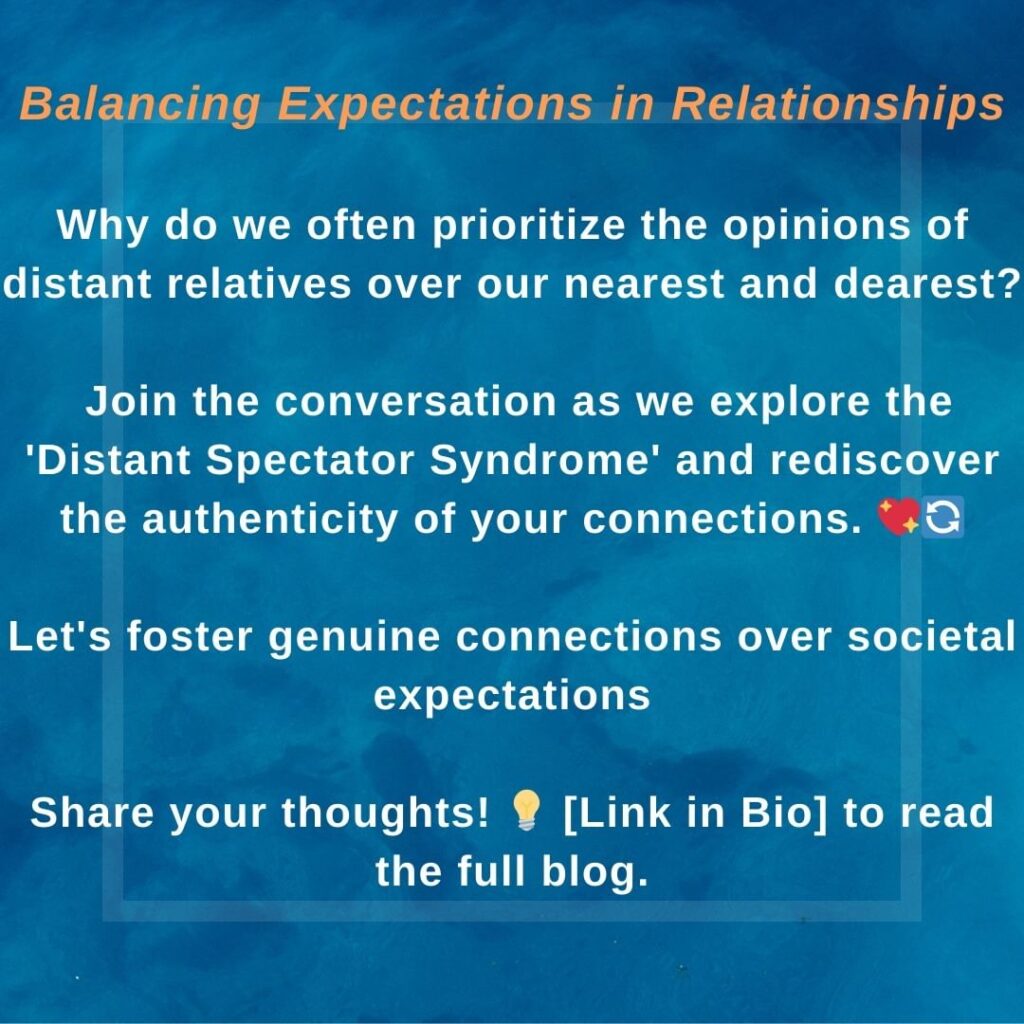-The Paradox of Proximity
Expectations in relationships – it’s a delicate balance, isn’t it? Why do we often prioritize the opinions of distant relatives over our nearest and dearest? Let’s dive into this paradox and rediscover the authenticity of our connections.

Understanding the Impact of Expectations in Relationships
In the intricate dance of relationships, a curious paradox often emerges — we find ourselves tiptoeing around the expectations of distant relatives while inadvertently taking our near and dear ones for granted. This unspoken imbalance raises a crucial question: why do we become hyper-aware of the judgments of those on the periphery while neglecting the impact of our actions on the ones closest to our hearts?
The Distant Spectator Syndrome:
It’s a scenario many can relate to. We meticulously plan our actions, words, and even expressions to appease the opinions of relatives who, in reality, play a minimal role in our day-to-day lives. This phenomenon, let’s call it the “Distant Spectator Syndrome,” sees us walking on eggshells for individuals whose perceptions should matter less than those we hold dear.
Social Validation vs. Authentic Connection:
The root of this paradox lies in our innate desire for social validation. Distant relatives, acquaintances, or even society at large become the judges in the court of our actions. We fear the raised eyebrows, the whispered judgments, and the potential gossip that might arise if we deviate from the expected script. In contrast, our near ones, the ones who witness our unfiltered selves, often bear the brunt of our unguarded moments.
The Weight of Expectations in Relationships:
The disparity in our consideration stems from the weight we assign to expectations. Distant relatives may carry societal expectations, and our actions become performances on a stage set for their approval. Meanwhile, with our close relationships, we assume an unspoken understanding, sometimes leading to a dangerous complacency.
Reclaiming Balance:
To break free from the shackles of the Distant Spectator Syndrome, it’s crucial to reassess the value we place on different perspectives. While societal expectations hold a place in our lives, they should never overshadow the importance of genuine connections. Recognizing the impact of our actions on our nearest and dearest is a vital step in reclaiming the balance in our relationships.
Cultivating Authentic Connections:
Authentic connections thrive in an environment of vulnerability and mutual understanding. By redirecting our focus from external judgments to the emotional well-being of those closest to us, we pave the way for deeper, more meaningful relationships. It’s a shift from performing for an audience to authentically connecting with the characters who share the stage of our lives.
Reclaiming Authenticity: Prioritizing Genuine Connections Over Expectations in Relationships
In the delicate art of balancing relationships, it’s time to recalibrate our focus. Let’s liberate ourselves from the undue pressure of societal expectations and redirect our energy towards fostering genuine connections. After all, it’s the authenticity of our relationships, not the applause of distant spectators, that truly defines the tapestry of our lives.
“Interested in exploring more insights on relationships and personal growth? Check out my related article on Feeling Unappreciated: Embrace Challenges for further inspiration and guidance.”
Read more: Feeling Unappreciated: Embrace Challenges
Do Follow for More Tips and Inspiration:
- Instagram: Follow us on Instagram
- Pinterest: Follow our Pinterest profile
FAQs
- What are common expectations in relationships?
- Explore common expectations such as trust, communication, and support that are often present in romantic relationships.
- How do unrealistic expectations impact relationships?
- Learn about the consequences of setting unrealistic expectations and how they can lead to dissatisfaction and conflict in relationships.
- How can couples manage conflicting expectations?
- Discover strategies for navigating and resolving conflicts that arise from differing expectations between partners.
- What role do societal expectations play in relationships?
- Understand the influence of societal norms and expectations on romantic relationships and how couples can navigate them.
- How can individuals communicate their needs and expectations effectively?
- Gain insights into healthy communication techniques that enable individuals to express their needs and expectations constructively.
- What are some signs that expectations in a relationship are unhealthy?
- Learn to recognize red flags indicating unhealthy expectations, such as controlling behavior or emotional manipulation.
- How can couples maintain realistic expectations over time?
- Explore strategies for fostering mutual understanding and realistic expectations as relationships evolve and grow.
- What impact do unmet expectations have on relationship satisfaction?
- Understand the correlation between unmet expectations and relationship dissatisfaction, and discover ways to address and manage them proactively.
- How can individuals balance personal expectations with those of their partner?
- Find tips for achieving a balance between individual needs and shared expectations within a relationship.
- What role does self-awareness play in managing expectations in relationships?
- Learn how cultivating self-awareness can help individuals recognize and manage their own expectations, leading to healthier and more fulfilling relationships.
